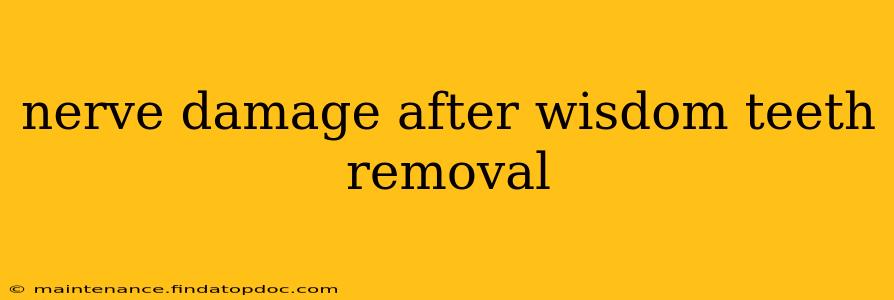Wisdom teeth removal is a common procedure, but like any surgery, it carries potential risks. One of the most concerning complications is nerve damage. This comprehensive guide explores the causes, symptoms, and treatment options for nerve damage following wisdom teeth extraction. We'll also address common questions surrounding this issue to provide you with a thorough understanding.
What Causes Nerve Damage After Wisdom Teeth Removal?
The nerves responsible for sensation in the lower jaw and chin are located in close proximity to the lower wisdom teeth. During extraction, particularly if the teeth are impacted (buried beneath the gum line) or have unusual root structures, these nerves can be inadvertently damaged. This damage can range from temporary numbness or tingling to permanent loss of sensation. The severity depends on the extent of the injury to the nerve. Experienced oral surgeons employ meticulous techniques to minimize this risk, but the close proximity of the nerves makes it an unavoidable possibility.
How Common is Nerve Damage After Wisdom Teeth Removal?
The exact incidence of nerve damage following wisdom teeth extraction is difficult to pinpoint definitively. Studies vary, but the occurrence is generally considered to be relatively rare, affecting a small percentage of patients. The risk increases with certain factors, such as impacted wisdom teeth, complex extractions requiring significant bone removal, and the individual's anatomical variations.
What are the Symptoms of Nerve Damage After Wisdom Teeth Removal?
Symptoms can manifest in various ways, and their intensity can vary significantly. They might include:
- Numbness: A complete lack of sensation in the lower lip, chin, or tongue.
- Tingling: A pins-and-needles sensation in the affected area.
- Pain: Sharp, shooting pains or a persistent dull ache.
- Weakness: Difficulty moving the muscles in the affected area, particularly the lower lip.
- Altered Taste: Changes in taste perception on one side of the tongue.
It's crucial to note that some temporary numbness or tingling immediately following surgery is common and usually resolves within a few weeks as the area heals. However, persistent or worsening symptoms warrant immediate medical attention.
How Long Does Nerve Damage After Wisdom Teeth Removal Last?
The duration of nerve damage varies considerably. In some cases, the sensation returns completely within a few weeks or months. In other instances, it can persist for much longer, even becoming permanent in rare cases. Regular follow-up appointments with your oral surgeon are essential to monitor progress and rule out more serious complications.
What are the Treatment Options for Nerve Damage After Wisdom Teeth Removal?
Treatment depends on the severity and duration of the symptoms. Options include:
- Medication: Pain relievers and anti-inflammatory drugs may help manage pain and inflammation.
- Time: Many cases resolve spontaneously with time and patience. Regular follow-up is crucial.
- Physical Therapy: In some instances, physical therapy techniques, including electrical stimulation, can help promote nerve regeneration.
- Surgery: In rare cases of severe or persistent nerve damage, surgical intervention may be considered to address the underlying issue, though this is generally reserved for situations where significant functional impairment persists.
Can Nerve Damage After Wisdom Teeth Removal be Prevented?
While complete prevention isn't always possible, choosing an experienced and highly skilled oral surgeon significantly reduces the risk. A thorough preoperative evaluation, including x-rays, helps the surgeon assess the complexity of the extraction and plan the procedure meticulously. Open communication with your surgeon about your concerns is also crucial.
What Should I Do if I Suspect Nerve Damage After Wisdom Teeth Removal?
If you experience persistent numbness, tingling, pain, or weakness after wisdom teeth removal, contact your oral surgeon or dentist immediately. Early intervention can improve the chances of a favorable outcome. Don't hesitate to seek medical attention; early diagnosis and appropriate management are key to maximizing recovery.
This information is for educational purposes only and should not be considered medical advice. Always consult with a qualified healthcare professional for any health concerns or before making any decisions related to your health or treatment.
